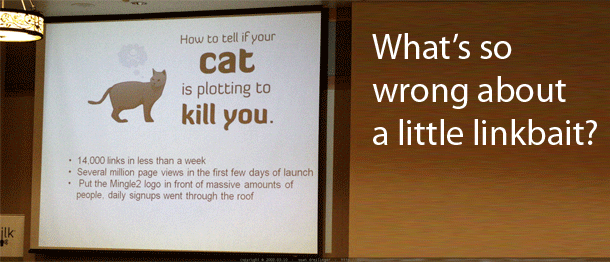
Credit: Sean Dreilinger via Flickr
Linkbait. You’ve probably heard of it. You probably know people who love it. You probably know people who hate it. Maybe you’ve even used it. Linkbait gets a bad rep, put on the same level as spam by some. Others see it a bit differently though. We understand that there is good linkbait as well as “bad” linkbait, just as email isn’t inherently evil just because it’s a tool used by spammers. Where do you fall? How do you feel about it?
Let’s take a look at the good sides of linkbait today, and how it can benefit your business website. But first, let’s cover some basics for those less familiar with it.

What is linkbait?
Linkbait (or link bait if you prefer) is just what it sounds like — something you release online in order to get people to link to you.
Why does linkbait get a bad rep?
The very word “bait” makes us think of traps, so it’s probably the misleading moniker that plays the biggest role in linkbait being dubbed the big bad wolf of the SEO world in the minds of some. That’s not fair though.
Yes, it can be misused. Think of a ridiculously hyped-up blog post title designed solely to suck you in, but followed by a post that doesn’t deliver the promised goods. That’s linkbait at its worst — sensationalist garbage. It doesn’t represent the full spectrum of linkbait however, so don’t judge based on association. Hey, would you want people to judge you based on what they know about your crazy Uncle George? Probably not.
Linkbait is good for you — Here’s why:
Linkbait needs to be evaluated on a case by case basis, just as you would judge the people who create it. What are their motives? Obviously they want to attract links, but there’s more to it than that when people create “good” linkbait.
It’s not just about benefiting you and your website. It’s about benefiting your visitors. Great linkbait does that. You’ll provide amazing content. You might offer a free tool. Whatever kind of linkbait ideas you release, great linkbait involves natural linking. You don’t have to beg and plead and try to con people out of their links.
You simply offer something that’s really worth linking to! There’s nothing wrong with that. It’s called offering value. When you provide real value to your visitors, they’ll happily spread the word about your content, your business, or your website.
What are some examples of linkbait ideas?
There is no single correct formula for successful linkbait. It comes in many forms. Here are some linkbait ideas to get you started on the path to creating more rewarding content, both for your site and your visitors.
- Write a comprehensive (and illustrated) tutorial.
-

Credit: BigStockPhoto.com Release a free tool or calculator.
- Release free software (or a free trial).
- Write and offer a free e-book or report.
- Write a controversial post, tackling an industry issue from a new perspective.
- Attack someone else’s controversial material.
- Write a list post (100 resources for your niche audience for example).
- Launch a contest with great prizes that people can get excited about.
- Create and post an entertaining video.
- Line up an interview with a major player in your niche or industry.
There are countless linkbait ideas available, and some of the best became linkbait naturally rather than by design (great content has a way of doing that). If you’re struggling to come up with ideas of your own, take a look around the Web. What’s on the front page of Digg today? What are people tweeting about? What struck you as so awesome recently that you had to spread the word about it?
Don’t be afraid to use linkbait. It’s not unethical in any way, especially if your visitors are a top concern when creating it. So don’t buy into the naysayers. They just don’t have the full picture.